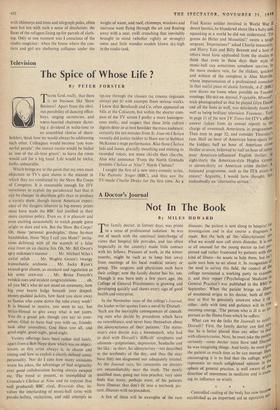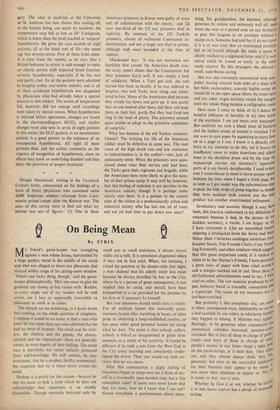A Doctor's Journal
Not In The Book
By MILES HOWARD
THE family doctor, in former days, was prone to a sense of professional isolation : he was out of touch with the continual interchange' of views that hospital life provides, and too often (especially in the country) made little contact with his fellows. Pressure of work, in the winter months, might be such as to keep him away from meetings of his local medical society or group. The surgeons and physicians each have their college; now the family doctor has his, too. Though; it was born only a few years ago, the College of General Practitioners is growing and developing quickly and shows every sign of good health and enterprise.
In the November issue of the college's Journal, the leader-writer quotes from a novel by Disraeli : 'Such are the inevitable consequences of consult- ing men who decide by precedents which have no resemblance, and never busy themselves about the idiosyncrasies of their patients.' The states- man's own doctor was a homceopath, who had to deal with Disraeli's 'difficult' symptoms and ailments—palpitations, depression, headache and the like : in short, his idiosyncrasy—not described in the textbooks of the day, and thus (he may have felt) not diagnosed nor adequately treated. As the Journal says, his comments on doctors are uncomfortably near the truth. The newly qualified man, going out into practice, very soon finds that many, perhaps most, of his patients have illnesses that don't fit into a textbook pic- ture, illnesses with no precedent.
A few of these will be examples of the rare
diseases; the patient is sent along to hospital for investigation and in due course a diagnosis Is made. But ,the bulk of the:. Idiosyncrasies' are what we would now call stress disorder. It is not at all unusual for the young doctor to feel per plexed and rather frustrated by .patients with 1111s kind of illness—he wants to help them, but isrl quite sure how to set about it. In recognition ra the need to survey this field, the council of the college nominated a working party to exaniale it, and their report (Psychological Medicine 1,r1 General Practice') was published in the BM/ in September. When the patient brings an Hines; of emotional origin to his doctor, both of them may at first be genuinely unaware what it sig. nifies : only with time and patience will its true meaning emerge. 'The person who is ill is as in' portant as the illness from which he suffers.'
What can .we do (asks the Journal) to salls" Disraeli? First, the family doctor can feel sure that he is •better placed than any other to deal with idiosyncrasies. Next, he must take the patient e seriously—some doctor must have told Disraeli he was imaginitig things. And lastly, he must glvwe the patient as much time as he can manage. 14°, encouraging it is to find that the college, which e represents so much enlightened opinion in the sphere of general practice, is well aware of the direction of movement in medicine and is exert, ing its influence so wisely.
Controlled cooling of the body has now become established as an important aid to operative 01r, gery. The tutor in medicine at the University of St. Andrews has now shown that cooling off, in the human being, can occur by accident; the temperature may fall as low as 24° Centigrade, which is lower than the level reached in 'surgical' hypothermia. He gives the case records of eight patients, all at the latter end of life—the mean age was seventy-seven. Five of them lived alone. It is clear from the reports, as he says, that a British bedroom in winter is cold enough to make an elderly person with impaired brain function severely hypothermic, especially if he lies wet and partly clad. Six of the patients were admitted to hospital within two winter months, and in all of them accidental hypothermia was diagnosed by physicians who had already taken a special interest in this subject. The extent of temperature fall, however, did not emerge until recordings were taken by special means. When hypothermia is induced before operations, changes are found in the electrocardiogram (ECG), and similar changes were also seen in seven of eight patients in this series; the ECG pattern, in an unconscious patient, is a good pointer to the existence of an unsuspected hypothermia. All eight of these patients died, and the author comments on the urgency of recognition of hypothermia, since its effects may mask an underlying disorder and thus delay the provision of proper, treatment.
.*
Dwight Macdonald, writing in the Twentieth Century lately, commented on the findings of a team of Army physicians who examined some 4,000 American soldiers returned from Com- munist prison camps after the Korean war. The aims of this survey were to find out what lay behind two sets of figures : (I) 'One in three American prisoners in Korea were guilty of some sort of collaboration with the enemy,' and (2) over one-third of the US war prisoners died in captivity. By contrast, of the 229 Turkish prisoners, almost all withstood Communist in- doctrination, and not a single one died in prison, although half were wounded at the time of capture.
Macdonald says : 'It was not starvation nor hardship that caused the American death rate; the army report shows that the Communists fed their prisoners fairly well. It was simply a lack of solidarity. When a Turk got sick, the rest nursed him back to health; if he was ordered to hospital, two well Turks went along and minis- tered to him. Many of the Americans died because they simply lay down and gave up. It was partly that no one looked after them, fed them and kept them on their feet, partly that they had lived too long in the land of plenty. The prisoners seemed quite unable to adapt to the primitive conditions of camp life.'
What has become of the old Yankee resource- fulness? The training for life of the American soldier must be defective in some way. The root • cause of the high death rate and low resistance to indoctrination is, in the author's view, lack of community sense. When the prisoners were ques- tioned about what their service unit had been, the Turks gave their .regiment and brigade, while the Americans were more likely to give the num- ber of their prison camp. It may well be, however, that this feeling of isolation is not peculiar to the American culture, though it is perhaps more clearly seen there. Is it a pointer to, the mental state of the citizen in a predominantly urban and industrial society who has lost one set of roots and not yet had time to put down new ones?















































































 Previous page
Previous page